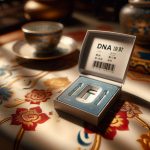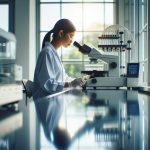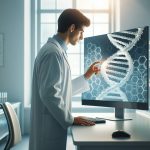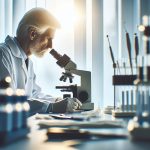Stephen Critchlow stands out as a unique figure in the business realm. Back in 1989, he embarked on a journey with the aim of enhancing healthcare through informed decisions at critical moments. This led to the creation of Ascribe, which quickly became indispensable, touching the lives of many across UK hospitals and extending its influence globally. Stephen didn’t stop there; his entrepreneurial spirit drove him into sectors such as health and sustainability. His commitment is further demonstrated by substantial investments exceeding £2m towards nurturing start-ups and social ventures within the UK.
In an enlightening discussion, Stephen introduces us to his pioneering stance on DNA mapping while discussing Evergreen life, an application that promises to advance scientific knowledge without leaning on traditional research hypotheses. This innovative approach signifies a shift toward leveraging technology for deeper understanding and better healthcare outcomes without being bound by conventional scientific methods.
Introduce yourself and describe your profession
In the early days, while working for the NHS, I spotted a critical gap: crucial data wasn’t readily accessible at care points. This observation led me to develop initial software and share it freely with peers. However, maintaining and upgrading this software demanded more time than I could afford alone. Consequently, what began as a modest initiative from my bedroom blossomed into a collaborative effort involving MSC students, medical professionals I encountered in my daily rounds, and other enthusiasts keen on making a difference. Despite its humble beginnings, the venture was never about profit but rather aimed at transforming practices.
As time went by, this side project matured into a significant entity that now provides services to 75% of NHS hospitals across the UK and has extended its reach to Australia, New Zealand, Hong Kong, and Malaysia. It stands as the premier provider of IT solutions in clinical settings within these regions. This journey started twelve years ago during an introspective phase where I pondered over my existence’s purpose. The realization hit me that driving change and impacting lives positively was my true calling—a philosophy that seamlessly integrated with business principles where providing genuine value naturally attracts financial rewards. This simple yet powerful mindset laid down the foundation for Ascribe, which witnessed tremendous success due to its core mission of effecting meaningful change.
In 2008, my focus shifted towards renewable energy with an aim to maximize carbon savings using available resources. This venture evolved into Evergreen Energy, marking another chapter in my journey towards making tangible differences not just environmentally but also in healthcare through investments in approximately twelve health tech firms involved in innovations ranging from bionic arms to social care applications.
One standout creation is Evergreen Life, our healthcare app designed with an eye on future trends. After selling Ascribe which later became publicly listed —with me serving as chairman for five years— it’s clear how much has changed over two-and-a-half decades of trade.
My academic background in pharmacokinetics revealed early on how unique each individual is—challenging the one-size-fits-all approach prevalent in conventional medicine treatments and drug trials that fail to consider personal differences such as size or genetics.
I’ve come full circle from observing firsthand inefficiencies within healthcare systems to spearheading initiatives aiming at personalized healthcare empowerment—a testament to how far vision coupled with relentless pursuit can lead you.
Which projects has Evergreen funded?
In the realm of investment, our focus is squarely on creating a positive impact in society. Take, for instance, the innovative work being done with bionic arms. While affluent societies have access to these technological marvels, their steep price tags place them out of reach for many. That’s where the visionary behind Open Bionics comes into play. He’s pioneering a way to produce functional and affordable bionic arms using 3D printing technology that could be easily accessed through mobile scanning. This groundbreaking project not only promises to revolutionize accessibility but does so without breaking the bank.
The founder continues his quest from within the UK, eyeing international expansion once initial testing concludes successfully. His creation has already gained recognition as an approved option by the NHS, marking a significant milestone in its journey.
Another venture making waves is SuperCarers. This platform transforms how families find and connect with professional caregivers for their loved ones. By facilitating direct connections between families and local caregivers online, it offers both cost savings for families and valuable employment opportunities for care professionals. SuperCarers stands out as an innovative solution rewriting the playbook on social care, an achievement recognized by its recent acquisition by a major provider after just five years since its inception.
Through these investments, we’re not just betting on companies; we’re championing technologies and services that promise a brighter future for all involved, proving that impactful change can stem from thoughtful investment strategies.
What sets ethical investments apart from regular profit-focused investments?

Monitoring the success of enterprises goes beyond merely eyeing their financial gains. It involves assessing the positive impact they have on communities and individuals they serve. This approach aligns with forward-thinking investors who prioritize a company’s societal contributions over mere profitability.
Investment strategies shouldn’t always be about chasing quick profits, as seen in the practices of some hedge fund managers who play the market’s ups and downs. Instead, embracing an ethical investing mindset means making choices that are not only good for one’s portfolio but also beneficial for society at large.
For example, avoiding investments in industries like fossil fuels and certain pharmaceutical companies reflects a commitment to social responsibility. Such ethical stances not only avoid contributing to harmful sectors but can also protect investors from downturns associated with these industries.
In essence, integrating moral values into investment decisions is not just about doing good—it’s about pioneering a successful and sustainable future for all. This principle has guided my investment choices, proving that one can maintain solid financial health without compromising ethical standards. By focusing on positive societal impacts and steering clear of ethically questionable sectors, it’s possible to achieve both financial stability and contribute to a better world.
The Impact of COVID-19 on Your Business and Sector
The surge in popularity of the Evergreen Life app is undeniable, with its user base expanding by 50,000 to reach a total of 800,000 in just three weeks. This isn’t just about numbers; people are spending significantly more time on the app and checking it out more frequently throughout the month. But what’s driving this uptick? It isn’t merely boredom or the quest for entertainment while stuck at home.
A closer look reveals a growing concern for personal health amidst the pandemic. With daily reminders that underlying health conditions can increase risk during these times, individuals are becoming more proactive about their well-being. The stark realities presented by COVID-19 have underscored the importance of good health practices, especially given how conditions like obesity can dramatically worsen outcomes.
Particularly telling is how vitamin D levels impact COVID-19 outcomes—a fact highlighted through DNA testing results within our community. Research involving hundreds has shown alarming disparities based on vitamin D levels among hospitalized patients, which influences survival rates drastically.
Given these insights, there’s a strong case for everyone to consider vitamin D tests and supplements as part of their health routine. Diet and lifestyle adjustments play crucial roles in bolstering defenses against severe impacts should one contract COVID-19.
Our platform aims to empower users with valuable information tailored to their unique profiles, enabling informed decisions about their health routines. During this period of uncertainty, we’ve noticed positive trends among our community members: reduced alcohol consumption, increased physical activity, and a greater reliance on our app for guidance toward healthier living choices. It’s clear—our service isn’t just an app; it’s becoming an essential tool for navigating these challenging times with confidence and control over one’s well-being.
What current trends and technologies catch your interest?
Harnessing the power of artificial intelligence (AI) and machine learning in the realm of healthcare is paving the way toward a more personalized approach to medicine. It’s about getting a grip on an individual’s health blueprint and figuring out precisely what actions will benefit them most. The direction healthcare research is heading towards is practical, rooted in real-world application rather than confined theories.
Traditionally, studies could pinpoint if you were lacking vitamin D through analyzing your genetic makeup, but this only scratches the surface. Many DNA characteristics remain a mystery due to the extensive time and resources required for traditional research. The game changer here lies in our development of models that spotlight correlations directly, cutting out the need for you to ask specific questions. We’re moving towards « pragmatic research, » where trials are naturally conducted through app usage and data logging by individuals themselves.
A tangible example of this innovative approach can be seen in current efforts to identify effective treatments for COVID-19 symptoms among licensed drugs. Collaborating with universities, we’ve embarked on a study involving 2,100 participants taking a particular medication not originally intended for COVID-19 but showing potential efficacy against it. Without realizing it at first, we’ve already completed an invaluable trial based on how these individuals fared after taking the drug for different reasons.
Looking ahead, there’s a promising horizon where everyone plays an active role in their health management by continuously recording their data. This shift empowers individuals over institutions regarding health decisions and contributes to ongoing research endeavors. With AI and deep learning at our disposal, we’re inching closer to fully understanding our unique health profiles and tailoring care that truly resonates with each person’s needs.
Based on your expertise in health technology, what should government officials prioritize to enhance access and quality of healthcare?
In today’s rapidly evolving medical landscape, the proposition of introducing mandatory DNA testing at birth presents a compelling argument. By embedding this practice into our healthcare records from day one, we stand on the cusp of revolutionizing how medical advice is tailored to each individual. With the cost of DNA tests now more affordable than ever, falling below £400 for a comprehensive analysis, the benefits far outweigh any potential drawbacks.
This approach does not just promise improvements in personal health management but also offers unprecedented insights into genetic predispositions on a wider scale. Such data can empower healthcare professionals to devise more effective strategies in combating hereditary diseases and conditions before they manifest or worsen.
However, enhancing our healthcare system doesn’t stop at genetic testing. Another crucial step forward is educating individuals about their own bodies. Knowledge is power, after all. By arming people with detailed understanding and awareness of their physiological makeup, we enable them to make informed decisions regarding their health and lifestyle choices. This shift towards personalized guidance marks a departure from generic advice that fails to account for individual variances.
Ultimately, integrating DNA testing into newborn health protocols alongside fostering greater bodily awareness among individuals could significantly elevate the quality and effectiveness of healthcare provided. It represents an investment in our future well-being by leveraging cutting-edge science for preventative care rather than merely responding to illnesses as they occur.


















